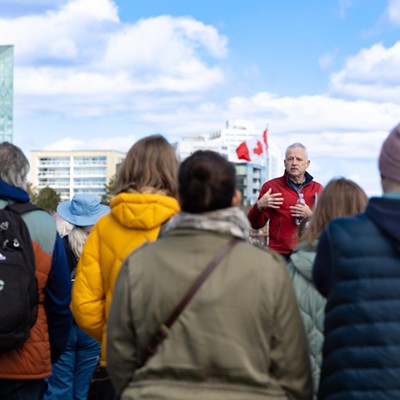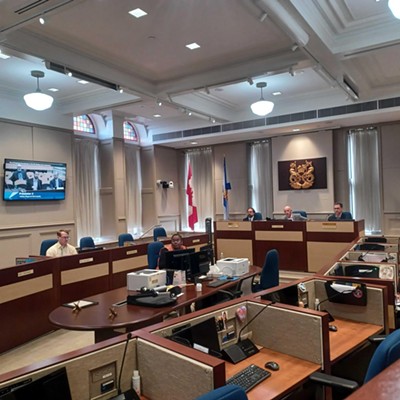A woman working alone at an all-night Ultramar gas station in Dartmouth was assaulted early Tuesday morning. The event rightly made the news, as the attack was particularly ugly -- the woman was reportedly raped, had her throat slit "from ear to ear" and was left for dead -- and raised important issues of protection for late-night workers. It's the legitimate-- essential, in my view-- role of the media to report on and discuss these issues.
But while many news outlets did good work ferreting out the issues, something else made the news: the rape victim's name.
I first read the victim's name in the Daily News, in an article under the sensationalist headline "I have been stabbed and I have been raped." The article, by reporter Beth Johnston, relayed how the victim managed to call her husband and 911. According to Johnston, medical personnel inserted a ventilation tube in her throat and told the victim not to speak. The victim later fell into unconsciousness.
For whatever reason, in the heat of the moment the victim's husband spoke with Johnston, revealing many personal details about his wife, including specific details of the assault and where she worked (she held three jobs). Johnston put those details in her article, along with the victim's name.
Note that at no time did the victim herself give consent for her name to be published.
I emailed Johnston Wednesday to ask her about the Daily News' policy with regard to publicizing rape victims' names. She did not respond, so I contacted her editor, Jack Romanelli, who responded:
Dear sir,Her name had already been used in Canadian Press and TV and radio reports. As a general rule, we do not publish names of sexual assault victims. However, in this case, she was the victim of an attempted murder in life-threatening condition at hospital.
I hadn't been aware that other media outlets were using her name, (for the record, the Chronicle-Herald and CBC Radio withheld her name, as is their policy), but I find this reasoning absurd: it is okay to release a rape victim's name if the attack is especially vicious.
Clearly, policies against naming victims of rape are implemented so as to not further victimize the assaulted. While it is not fair or proper, it is nonetheless true that our society still defines rape victims by their rape. As Bob Steele, an ethicist with the Poynter Institute, writes:
As I wrestled with all of this, I was drawn to the thinking of journalist and author Helen Benedict. I consider her 1992 book Virgin or Vamp: How the Press Covers Sex Crimes, to be one of the most thoughtful treatments of this issue.Benedict's book provides important historical context, delving into matters of gender, race, culture, and language. She also identifies a number of "rape myths" that can warp the public debate and skew the decisions of journalists. And Benedict examines those engrained newsroom cultures, belief systems and professional practices that determine what editors and reporters do on stories about rape. She also identified eight factors "that lead the public, and the press, to blame the victim for the rape and to push her into the role of 'vamp.'"
Importantly, Benedict addresses whether rape is about sex or about violence. "Rape is best characterized as torture that uses sex as a weapon. Like a torturer, the rapist uses sexual acts to dominate, humiliate, and terrorize the victim," Benedict writes.
"To deny the role of sexual humiliation in rape is to deny victims the horror of what they have been through. As long as people have any sense of privacy about sexual acts and the human body, rape will, therefore, carry a stigma, not necessarily a stigma that blames the victim for what happened to her, but a stigma that links her name irrevocably with an act of intimate humiliation."
"To name a rape victim is to guarantee that whenever somebody hears her name, that somebody will picture her in the act of being sexually tortured. To expose a rape victim to this without her consent is nothing short of punitive."
I see a suggestion of this "blaming the victim" in the phrasing of Johnston's article:
was working the back shift at the Portland Street Ultramar when she was assaulted by a man she buzzed in.When her husband arrived at the Ultramar, police - whom the victim had called moments after she called him - wouldn't let him near the bloody crime scene.
The suggestion, by my reading, is that the victim improperly "buzzed in" her attacker. More, Johnston implies that the victim stupidly called her husband before calling police.
Certainly, Johnston never directly blames the victim. But the above phrasing, coupled with the release of the victim's name (without her consent) and details of her personal life, broadly hint that something is wrong with the entire scenario.
More, the fact that the Canadian press and TV stations named the woman doesn't excuse the Daily News. As noted above, at least two other media outlets restrained themselves. This is the sort of policy that each newsroom must decide for themselves, and whatever the ethical failures of the CP and TV stations, the ethical failure of the Daily News is distinctly their own.
As for the victim's husband, I can't fathom why he spoke with the press. Perhaps he was overwhelmed by events. Perhaps he thought he was doing the best thing for his wife. Regardless: he is not his wife. He cannot give consent for his wife, and the press cannot take his statements as her consent. To do so is sexist, at best.
Minutes after my first email exchange with Romanelli Wednesday afternoon, I received a follow-up message:
Just for your information, a publication ban has been placed on the victim’s name as of this morning.
Seems the court agrees with me. Still, at 5 p.m. Wednesday, Johnston's article was on the front page of the Daily News' website.
It has since been removed.
The tens of thousands of papers in print, however, remain.









